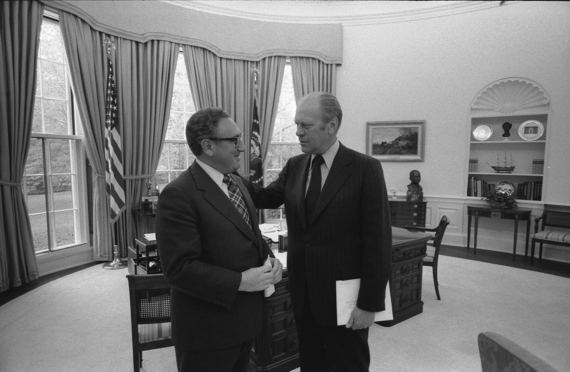Henry Kissinger is known for a lot of things: professor; dean of the foreign policy realists; National Security Adviser for President Richard Nixon; Secretary of State for President Gerald Ford; negotiator of the Paris Peace Accords that ended U.S. involvement in the Vietnam War; the man who preyed with Nixon at the height of his distress over the Watergate scandal. The 91-year old is still offering his foreign policy and national security advise to countless administrations, can be seen on television doing interviews on occasion, and served often as outside counselor to the George W. Bush administration on the Iraq War.
Thanks to the good folks and diligent researchers at the National Security Archive--a research organization at George Washington University--Americans will now be able to add another placeholder for the former Secretary of State: hater of the Castros.
On the face of it, this shouldn't be a surprise to anyone. The historical record on U.S.-Cuba relations is quite clear: successive administrations for decades have attempted to kill Fidel Castro, overthrow his regime, and create something in its place that would increase American influence on the island 90 miles south of the U.S. mainland. All of those plots have failed, from the 1960 Bay of Pigs disaster to the numerous failed assassination attempts on Castro himself. The most successful policy that the United States can point to is the Cuban embargo, which has been in place for over half a century and was originally designed to make life so miserable for the Cubans that they would take matters into their owns and get rid of the Castro clan themselves.
What is interesting from the newly declassified documents, however, is the fact that the United States in general and Henry Kissinger in particular were so peeved by Cuban interference in Africa during the 1970's that they were actively planning a bombing run on Cuban military infrastructure and a tightening of the embargo around the island. The conversations reached President Gerald Ford directly, when on March 24, 1976, Kissinger argued to the president in the Situation Room that Washington needed to punish the Castro regime for its blatant military involvement in Angola at the height of the Cold War:
Kissinger: That is a possibility -- I may have to go out there if it really gets bad.I think sooner or later we have tq crack the Cubans. I talkedto Yamani last Friday and even the Iranians are worried about the Cubans getting into the Middle East countries. I think we have to humiliate them. If they move into Namibia or Rhodesia, I would be in favor of clobbering them. That would create a furor and we might have to come out for black rule. But I think we might have to demand they get out of Africa.
The President: What if they don't?
Kissinger: I think we could blockade. But I think we need a WSAGand maybe an NSC. But I don't think we have to identify where they might move -- just examine contingencies for wherever they might act.
On President Ford's orders, Kissinger was authorized to assemble a secret working group with representatives from the Joint Chiefs of Staff, Defense Department, State Department, the Central Intelligence Agency, and National Security Council to explore what the United States could do to ensure that retaliatory measures taken against Castro for Cuba's involvement in Africa were effective and would get the messages across. The discussions were so intense that a few inter-agency papers were produced outlining the political, economic, and military options Washington could employ against the Cuban Government to deter their meddling in a third-world Cold War battleground. The list includes everything from a quarantine by the U.S. Navy, which would block any military equipment from reaching or leaving the island, to diplomatic moves like slapping trade sanctions on Cuba at the the United Nations and lobbying Cuba's Asian and Latin American partners to stop their credit financing or assistance programs. One of the more interesting choices that the team explored was a punitive U.S. military strike on important Cuban military installations and facilities:
"The Atlantic Command will conduct military operations in Cuba to defend NAVBASEGTMO; and to destroy selected high value Cuban military and military supporting targets which will have the maximum punitive impact in order to counter specific acts of Cuban aggression."
Viewed in full, the declassified documents demonstrate just how much time, energy, and man hours the Ford administration put into this project. The planning memos and options papers were rich in detail and covered every policy under the sun that could be used to deter Castro from continuing down his interventionist path. The full series of documents can be found here.
One wonders whether Kissinger and Castro have forgiven one another in their later years of life.


